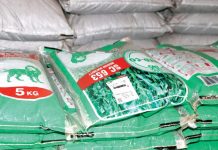Africa-Press – Malawi. The latest World Bank Malawi Economic Monitor (Mem) has said the Land Amendment Bill passed by Parliament in March this year could deter investors from actively participating in the flagship mega farms project.
But Principal Secretary for Lands Davie Chilonga Wednesday disagreed with the concerns raised in the Mem. The 16th Mem, titled ‘Planning Beyond the Next Harvest: Advancing Economic Stability and Agricultural Commercialisation’, was unveiled in Lilongwe on Thursday.
The Mem says the government’s commitment to large-scale commercialised agriculture has not been reflected in recent policy initiatives. “The Land Amendment Bill, passed in March 2022, is seen by many producers as introducing additional obstacles to operating a commercial farm, without significantly improving the security of land tenure.
“This could also impact the government’s plans to establish mega farms i.e. government-owned but privately-run farms of at least 5,000 ha [hectares] with a high degree of mechanisation and value addition,” the bank says.
In an interview Wednesday, Secretary for Lands Chilonga said it is sad to note that the authors of the report may have misleading understanding of the changes in the law whose enactment is very timely.
He argued that such allegations are not true since such investments did not even happen between 1965 and 2022. According to Chilonga, genuine investments have space provided for in the cited laws when using inclusive models.
“For example, the current land laws are supporting creation of mega farms like Kama in Chikwawa under Agriculture Commercialisation Project and over 15 irrigation blocks ranging from 500 to over 1,000 hectares under Shire Valley Transformation Programme that will be commercially run.
“Government is also working on Thola, Ilora, Ngosi Irrigation in Karonga under Green Belt Authority, which will cover 10,000 hectares and many other farms to be commercially run,” Chilonga said.
For More News And Analysis About Malawi Follow Africa-Press






